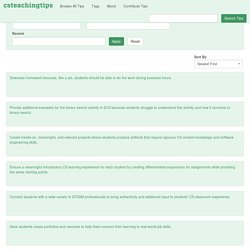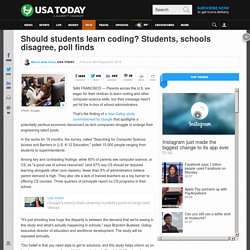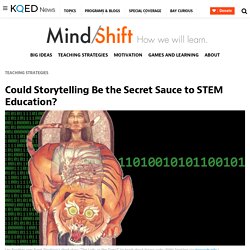

Browse All. Skip to main content Sort By Newest First Downsize homework because, like a job, students should be able to do the work during business hours.

Provide additional examples for the binary search activity in ECS because students struggle to understand this activity and how it connects to binary search. Create hands-on, meaningful, and relevant projects where students produce artifacts that require rigorous CS content-knowledge and software engineering skills. Ensure a meaningful introductory CS learning experience for each student by creating differentiated expansions for assignments while providing the same starting points. Connect students with a wide variety of STEAM professionals to bring authenticity and additional input to students’ CS classroom experience.
Have students create portfolios and resumes to help them connect their learning to real-world job skills. Use the AntiCutAndPaste plagiarism detection tool to easily discover if any of your students are cheating off of one another. Welcome to the CS10K Community! New Federal Law Means Computer Science Is Officially Part of STEM. Should students learn coding? Students, schools disagree, poll finds. SAN FRANCISCO — Parents across the U.S. are eager for their children to learn coding and other computer-science skills, but their message hasn't yet hit the in-box of school administrators.

That's the finding of a new Gallup study commissioned by Google that spotlights a potentially perilous economic disconnect as tech companies struggle to enlarge their engineering talent pools. In the works for 18 months, the survey, called "Searching for Computer Science: Access and Barriers in U.S. K-12 Education," polled 15,000 people ranging from students to superintendents. Among key and contrasting findings: while 90% of parents see computer science, or CS, as "a good use of school resources" (and 67% say CS should be required learning alongside other core classes), fewer than 8% of administrators believe parent demand is high.
They also cite a lack of trained teachers as a top barrier to offering CS courses. "Giving students access to CS is the right thing to do," he says. Could Storytelling Be the Secret Sauce to STEM Education? In the short story “The Ones Who Walk Away from Omelas,” author Ursula Le Guin describes a utopian city that has everything people want or need — beauty, religion, happiness — but it’s all possible because one child is kept in the dark, separated from all joy and light.

Citizens of the city have to go and see this boy, but some can’t take the guilt and walk away. After reading the story, Lev Fruchter and his class talk about what elements make up utopia and use the conversation as a jumping-off point to talk about equations. They talk about adding good things and multiplying them if they’re really great or, inversely, subtracting things that make people unhappy and dividing the really bad elements. This is all a way of thinking about the math that will eventually run a computer program. Fruchter loves words, but is comfortable enough with math and science that he was called upon to teach them. “I’m a narrative learner,” said Fruchter. Online Learning: A Bachelor's Level Computer Science Program Curriculum (Updated)
Introduction [Update: See also the follow-up post to this piece, An Intensive Bachelor's Level Computer Science Curriculum Program.]

A few months back we took an in-depth look at MIT’s free online Introduction to Computer Science course, and laid out a self-study time table to complete the class within four months, along with a companion post providing learning benchmarks to chart your progress. In the present article, I'll step back and take a much more broad look at com-sci course offerings available for free on the internet, in order to answer a deceptively straightforward question: is it possible to complete the equivalent of a college bachelor’s degree in computer science through college and university courses that are freely available online?
And if so, how does one do so? The former question is more difficult to answer than it may at first appear. Yet, this does not mean that all the necessary elements for such a curriculum are not freely accessible. Introductory Courses.
Activities Without Computers. Overview Info. App Development. Coding Clubs. Coding Frameworks. Computational Thinking. Hardware. K-12. K-12 Resources. Programming Contests. Programming Tools. Training. Website Development.